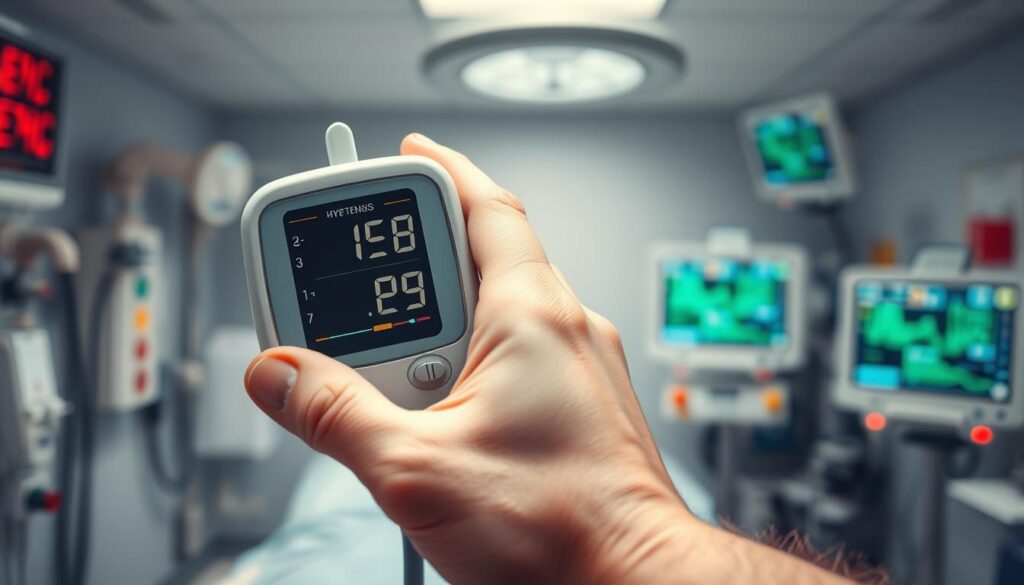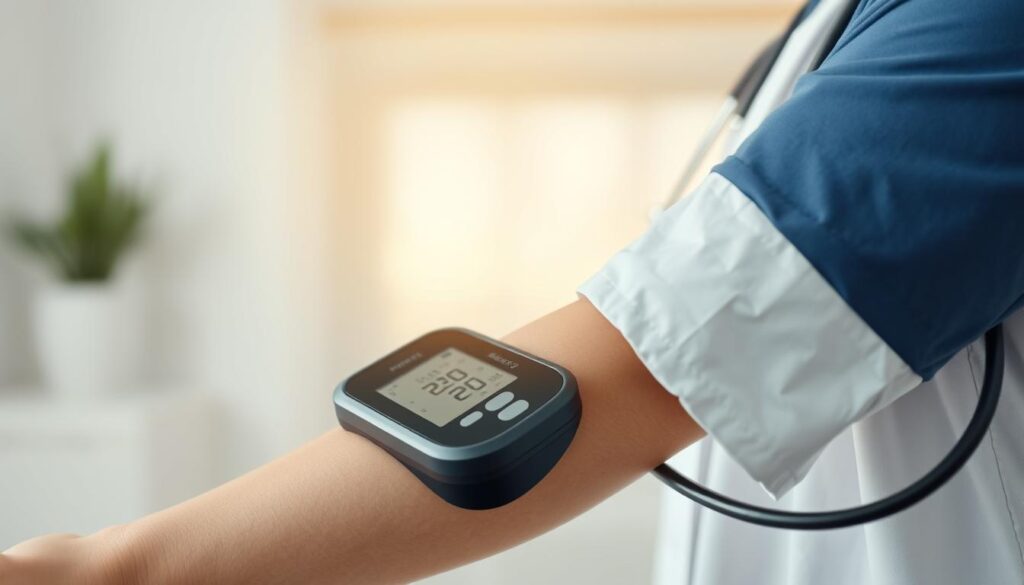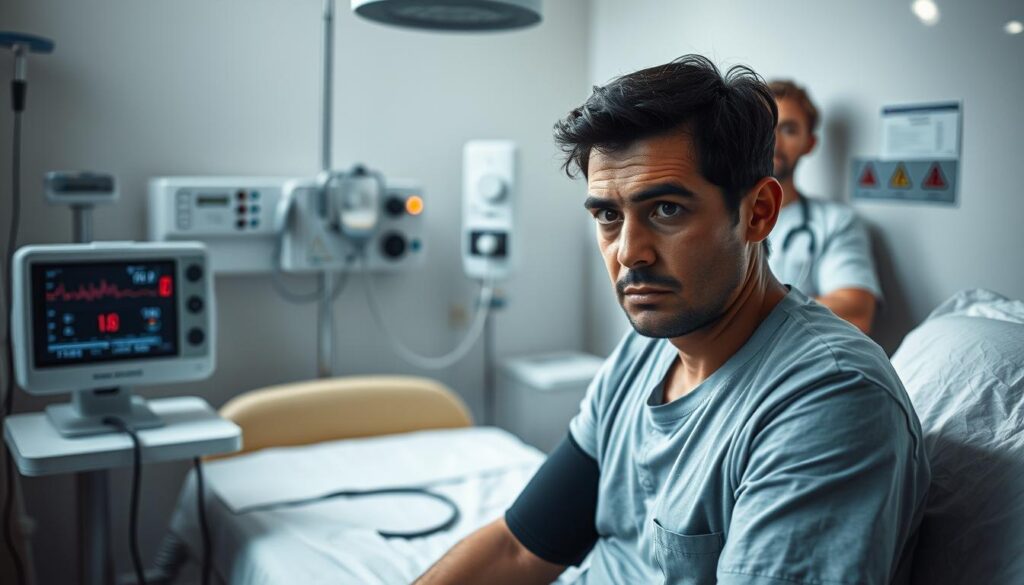A hypertensive crisis is when blood pressure suddenly goes up a lot. It’s over 180/120 millimeters of mercury (mm Hg). This is a big emergency that needs quick help.
This serious problem can hurt your organs, cause a stroke, or lead to a heart attack. It’s very important to know the signs and get help fast when your blood pressure gets too high.
Key Takeaways
- Hypertensive crisis is a medical emergency with blood pressure readings of 180/120 mm Hg or higher.
- Immediate medical attention is essential to prevent life-threatening complications like organ damage, stroke, and heart attack.
- Symptoms can include chest pain, shortness of breath, and signs of stroke such as numbness or vision changes.
- Causes may involve medication issues, certain medical conditions, or lifestyle factors like sleep deprivation.
- Treatment typically involves hospitalization, medication to lower blood pressure, and monitoring for organ damage.
Understanding Hypertensive Crisis and Its Severity
Hypertensive crisis is a serious condition. It happens when blood pressure goes up very fast. This is very bad for your heart.
A crisis is when your blood pressure is too high. It needs to be treated right away. If not, it can be very dangerous.
What Defines a Blood Pressure Emergency
A blood pressure emergency is when it’s really, really high. It’s over 180/120 mm Hg. This is very bad and can hurt your heart, brain, and kidneys.
You need to see a doctor right away. They can help stop serious problems.
Critical Blood Pressure Numbers to Watch
Watch your blood pressure closely. If it’s over 180/120 mm Hg, it’s a crisis. This means you need to see a doctor fast.
Impact on Vital Organs
Hypertensive crisis can hurt your heart. It can also cause problems in your brain, kidneys, and eyes. This can lead to strokes, kidney failure, and vision loss.
“Approximately 30% of adults in America have hypertension, and among those, about 1% to 2% will experience a hypertensive crisis, encompassing both hypertensive emergency and hypertensive urgency.”
When High Blood Pressure Is an Emergency
Hypertensive emergencies need quick medical help. If your blood pressure is 180/120 mm Hg or higher, get help fast. This is especially true if you have a severe headache, chest pain, or trouble breathing.
Even without symptoms, very high blood pressure is a big problem. It can cause serious issues like stroke, heart attack, and kidney damage. Not treating it right away can be very dangerous.
The American College of Cardiology and the American Heart Association say blood pressure over 130/80 mm Hg is high. To be diagnosed with hypertension, you need three high readings over six months.
“Over 75% of people with diabetes are also diagnosed with hypertension, indicating a strong correlation between the two conditions.”
Some medicines, health issues, and lifestyle choices can cause blood pressure to rise quickly. This can lead to a hypertensive emergency. If your blood pressure gets too high, call for emergency help right away, even without symptoms.
Your health and safety are most important. If your blood pressure is very high, call for emergency help. Quick action can prevent serious problems and save your life.
Types of Hypertensive Crises: Urgent vs. Emergency
Hypertensive crises are sudden and severe blood pressure spikes. They are urgent or emergency types. Knowing the difference is key to getting the right medical help fast.
Understanding Urgent Hypertensive Crisis
An urgent hypertensive crisis has blood pressure over 180/120 mm Hg. It doesn’t show organ damage yet. It’s a serious situation that needs quick help but isn’t always life-threatening.
People might feel very bad, like having a severe headache or trouble breathing. They might also get nosebleeds or feel very anxious.
Recognizing Emergency Hypertensive Crisis
An emergency hypertensive crisis has the same high blood pressure but with organ damage. This is a more serious case that needs fast and strong treatment. It often means going to the hospital.
It can lead to serious problems like stroke or heart attack. Getting help right away is very important.
Both urgent and emergency crises need quick medical help. They can lead to serious problems like stroke or heart attack. Getting help fast is very important.
| Characteristic | Urgent Hypertensive Crisis | Emergency Hypertensive Crisis |
|---|---|---|
| Blood Pressure Levels | ≥180/120 mm Hg | ≥180/120 mm Hg |
| Organ Damage | No signs of organ damage | Life-threatening organ damage |
| Treatment Approach | Slow lowering of blood pressure over 24-48 hours | Rapid lowering of blood pressure within 1 hour |
| Recommended Medications | Captopril, clonidine, labetalol | IV antihypertensive agents (labetalol, esmolol, nitroglycerin, etc.) |
| Hospitalization | May not require hospitalization | Requires hospitalization |
Knowing the difference between urgent and emergency hypertensive crises helps. It lets you get the right medical care fast. This is important for serious situations.
Warning Signs and Symptoms of Blood Pressure Emergency
A blood pressure emergency needs quick medical help. Watch for these signs:
- Severe headache
- Vision problems, such as blurred or impaired vision
- Chest pain
- Shortness of breath
- Nausea and vomiting
- Confusion or anxiety
- Seizures
Also, look out for stroke symptoms. These include numbness, trouble walking or speaking, and vision changes. If you have these symptoms with very high blood pressure, get help right away.
| Symptom | Potential Cause |
|---|---|
| Severe headache | Elevated blood pressure can cause blood vessels to swell, leading to intense headaches. |
| Vision problems | High blood pressure can damage the small blood vessels in the eyes, causing blurred or impaired vision. |
| Chest pain | Extremely high blood pressure can strain the heart and lead to chest pain or discomfort. |
| Shortness of breath | Severe hypertension can cause fluid buildup in the lungs, making it difficult to breathe. |
| Confusion or anxiety | A hypertensive crisis can affect brain function, leading to disorientation, confusion, and heightened anxiety. |
If you see any of these signs, don’t wait. Quick action is key to avoid serious problems.
Common Causes of Severe Blood Pressure Spikes
A sudden and severe spike in blood pressure is called a hypertensive crisis. It’s a medical emergency. Knowing why this happens is key to knowing when to get help fast.
Medication-Related Triggers
Not taking your blood pressure meds or stopping heart medicines too soon can cause a crisis. Taking the wrong medicines together can also raise your blood pressure.
Medical Conditions That Increase Risk
Some health issues, like a tumor in the adrenal gland, can make blood pressure go up too high. Kidney problems, pregnancy issues, autoimmune diseases, spinal cord injuries, and narrowed renal arteries are also risks.
Lifestyle Factors
Your daily habits can also lead to sudden blood pressure spikes. Too much stress, eating too much salt, using drugs like cocaine, and not moving enough can all raise your blood pressure.
Knowing these causes can help you spot the signs of a blood pressure emergency. If you see these signs, get medical help right away.
| Cause | Description |
|---|---|
| Medication-Related Triggers | Forgetting to take blood pressure medications, suddenly stopping certain heart medications like beta blockers, and medication interactions |
| Medical Conditions | Pheochromocytoma (adrenal gland tumor), kidney disorders, pregnancy-related conditions, autoimmune diseases, spinal cord injuries, renal artery stenosis |
| Lifestyle Factors | Excessive stress, high-salt diet, substance abuse (cocaine, amphetamines), sedentary lifestyle |
Immediate Steps to Take During a Blood Pressure Emergency
If you think you or someone else has a hypertensive emergency with very elevated bp levels, act fast. Call 911 or your local emergency services right away.
Stay calm and sit or lie down in a comfy spot while waiting. If you have chest pain or trouble breathing, rest and avoid hard work. Don’t try to lower your blood pressure by yourself unless a doctor tells you to.
When the emergency team comes, tell them about your symptoms, health history, and medicines. This helps them treat you right.
“A hypertensive emergency is very high blood pressure, like 180/120 or more. Quick medical help is key to avoid organ damage or serious problems.”

Remember, a hypertensive emergency is a big deal that needs quick help. By acting fast and getting professional care, you might save a life.
Medical Treatment and Emergency Interventions
When you have a hypertensive crisis, getting quick medical help is key. If your blood pressure goes up very high, very fast, you need to go to the hospital right away. Doctors and nurses in the hospital use special medicines to help you.
Hospital-Based Treatment Options
People with a hypertensive crisis often need to stay in the hospital. Doctors watch them closely and give them special care. They want to lower your blood pressure fast but safely.
This helps keep your heart and other important organs safe. Doctors might give you medicines through an IV. These medicines help your blood vessels relax and your heart work less hard.
Emergency Medications Used
- Vasodilators: These medicines, like nitroglycerin or sodium nitroprusside, make your blood vessels wider. This lets blood flow better.
- Beta-blockers: Drugs like labetalol or esmolol help lower your blood pressure. They make your heart work less hard.
- ACE inhibitors: Medicines like captopril or enalapril stop a hormone that makes blood vessels tight.
The medicines used depend on your situation and health. Doctors watch how you react to the medicines. They change them if needed to keep your blood pressure safe.
In some cases, people with a hypertensive crisis might go to the ICU. This is for closer watching and care. Doctors want to make sure you’re okay and your blood pressure is safe.
Long-Term Prevention Strategies
If you’ve had a hypertensive crisis, it’s key to prevent future ones. By using long-term strategies, you can control your blood pressure. This helps avoid dangerous spikes in hypertensive crisis, blood pressure spike, or elevated bp levels.
One important step is to take your blood pressure meds as told. Also, check your blood pressure at home and at doctor visits. This helps catch problems early.
Eating a diet low in sodium is also crucial. Try to eat less processed food. Instead, choose fresh foods like sweet potatoes, spinach, and bananas.
Regular exercise is vital for blood pressure control. Aim for 30 minutes of aerobic activity daily. Activities like brisk walking, cycling, or swimming are good. Stress management, like meditation or yoga, also helps keep blood pressure healthy.
Don’t smoke and drink alcohol in moderation. Quitting smoking and drinking less can greatly improve your heart health. It also lowers your risk of hypertensive crises.
Lastly, keep up with doctor visits and report any blood pressure changes or new symptoms. This lets your doctor adjust your treatment plan as needed.
By following these prevention steps, you can manage your hypertensive crisis, blood pressure spike, and elevated bp levels. This reduces the chance of future emergencies and keeps you healthy.

Conclusion
Knowing when high blood pressure is an emergency is very important. It helps prevent serious problems. Look out for warning signs and know your blood pressure numbers.
If you think you’re having a hypertensive crisis, get help right away. Taking care of your blood pressure can keep your heart healthy.
Hypertensive crises need quick action to avoid serious damage. Knowing the symptoms and treatment helps manage your blood pressure. Your health is very important, so don’t ignore high blood pressure.
Stay alert and work with your doctor to manage your blood pressure. Understanding emergencies and acting fast can save your life. It also helps you stay healthy for a long time.


A Life-Changing Experience with This Weight Loss Supplement (Nagano Tonic)
I’ve always struggled with finding a weight loss solution that actually works for me. Like many, I’ve tried numerous diets, exercise routines, and supplements over the years—some worked for a short time, but nothing ever gave me long-term results. That was until I decided to try the weight loss supplement I found : Link to the Supplement.
From the moment I started using it, I noticed a difference. Not only did I feel more energized, but my cravings also became more manageable. The best part? I started seeing results much quicker than I anticipated! Over the course of just a few weeks, I noticed a significant reduction in belly fat and overall weight loss that I hadn’t been able to achieve before.
What makes this supplement stand out from all the others I’ve tried is how it supports me in my daily routine without any jitters or energy crashes. I’m able to stay focused and motivated, which has made it easier to stay on track with my diet and exercise plan.
This product truly exceeded my expectations, and I feel more confident and healthier than ever before. If you’re struggling with your weight loss journey like I was, I highly recommend giving this supplement a try. It’s been a game-changer for me, and I’m sure it can work wonders for you too!
Contant Them on email .. tonicnagano50@gmail.com
I’ve tried so many weight loss products over the years, but nothing worked like this supplement! Since I started using it, I’ve noticed a big difference in my energy levels and appetite control. In just a few weeks, I’ve lost weight and feel so much better. It’s been easy to stick with, and the results speak for themselves. Highly recommend this to anyone looking to make a real change!
This Nagano Tonic has been amazing! In just a few weeks, I’ve lost weight, feel more energized, and my cravings are under control. Highly recommend it!
Thats the link to purchase http://surl.li/iasppy